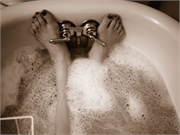- Could Your Grocery Store Meat Be Causing Recurring UTIs?
- Are You Making This Expensive Thermostat Error This Winter?
- Recognizing the Signs of Hypothyroidism
- 10 Strategies to Overcome Insomnia
- Could Artificial Sweeteners Be Aging the Brain Faster?
- Techniques for Soothing Your Nervous System
- Does the Water in Your House Smell Funny? Here’s Why
- Can a Daily Dose of Apple Cider Vinegar Actually Aid Weight Loss?
- 6 Health Beverages That Can Actually Spike Your Blood Sugar
- Treatment Options for Social Anxiety Disorder
Soaking in a Hot Bath Might Do Your Heart Good

One of the few pleasures left to Americans sequestered at home is a soak in a hot bath.
Now, research from Japan involving more than 30,000 adults suggests a daily bath might do more than cleanse and relax — it might also help lower your odds for heart disease and stroke.
“We found that frequent tub bathing was significantly associated with a lower risk of hypertension, suggesting that a beneficial effect of tub bathing on risk of [heart disease] may in part be due to a reduced risk of developing hypertension,” wrote a team led by Dr. Hiroyasu Iso, professor of social and environmental medicine at Osaka University.
Their new study tracked participants from 1990, when they were ages 45-59, until they died or until the end of 2009, whichever came first.
After accounting for other factors, the researchers found that — compared with a once or twice weekly bath or no bath at all — taking a hot bath each day was associated with a 28% lower risk of heart disease, and a 26% lower risk of stroke.
Water temperature seemed to matter: Further analysis showed that there were 26% lower and 35% lower risks of heart disease associated with warm baths and hot baths, respectively, but there was no significant association between bath water temperature and stroke risk.
The frequency of baths did not seem to affect the odds for certain cardiac events, such as sudden cardiac death or a type of stroke known as subarachnoid hemorrhage (bleeding into the space surrounding the brain), the team noted.
The study was published online March 24 in the journal Heart.
Iso and colleagues stressed that this is an observational study, so it can’t establish cause and effect. However, they noted that prior research has pointed to a link between heat exposure and heart disease prevention because the effects of heat on the body are similar to those of exercise.
One U.S. heart expert said the findings aren’t all that surprising.
“The concept of daily bathing improving cardiovascular outcomes makes sense,” said Dr. Guy Mintz, who directs cardiovascular health at Sandra Atlas Bass Heart Hospital in Manhasset, N.Y. “Bathing in warm or hot water is associated with dilation and relaxation of the blood vessels causing a reduction in blood pressure and an improvement in the cardiac output.”
He also said that a nice bath before bedtime might help improve sleep, and better sleep has long been tied to better cardiovascular health.
Mintz added that the benefit might be even more among the Japanese, since “Japanese bathing involves immersion to the shoulders, which is above the heart.”
But taking a hot bath can also pose risks for older people, editorialist Dr. Andrew Felix Burden noted.
“There can be no doubt about the potential dangers of bathing in hot water, and the occurrence of death from this increases with age, as well as with the temperature of the water,” Burden wrote. Although heart disease itself is unlikely to be the cause of these deaths, overheating, leading to confusion and drowning, most likely is, he suggested.
“Investigations into the potential cardiovascular benefit of heat-free immersion in warm to hot water are needed,” Burden wrote. “In the meanwhile, caution is needed because of the higher mortality associated with such bathing in an unselected population.”
Dr. Satjit Bhusri is a cardiologist at Lenox Hill Hospital in New York City. Reading over the new findings, he agreed that “by causing blood vessels to dilate, [a hot bath] forces the heart to work harder. It is, in some regards, a daily exercise for the body. Of course, as the study notes, there are potential associated dangers.”
More information
The U.S. National Heart, Lung, and Blood Institute offers a guide to a healthy heart.
Source: HealthDay
Copyright © 2026 HealthDay. All rights reserved.










